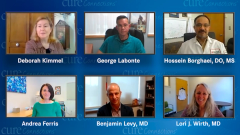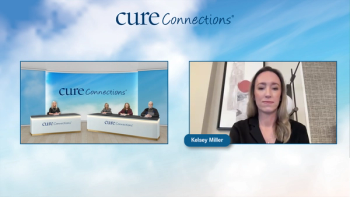
Precision Medicine and Clinical Trials
Online resources available to patients with lung or thyroid cancer who are considering participation in a clinical trial after undergoing comprehensive genomic profiling.
Episodes in this series

Hossein Borghaei, DO, MS: As we’re coming close to the end of the program, I want to ask questions related to after getting the biomarker results, from the patient point of view. Let’s say the testing was done, what are the options that I have at this point? What are the drugs that are available to me? As part of that discussion, Ms. Ferris, maybe I can start with you. What are some of the good resources that patients can go to and get some of this information? For instance, where do we go if we have an ALK alteration, a possible RET fusion, and are looking for a clinical trial, what are some of the resources that are available for patients?
Andrea Ferris: I think talking to your doctor is the first step. I think in lung cancer, it’s somewhat unique because there are so many clinical trials that are now the first therapy that a patient will get. For us, clinical trials are really a form of treatment and they’re one of the treatment modalities and options that are available for patients. We like to emphasize that part of it. But, there are patient advocacy groups. There’s LUNGevity, there’s GO2 Foundation, there are others out there too that have resources for people to learn more about what a clinical trial is.
For clinical trial matching, we have a clinical trial finder app on our website, a clinical trial ambassador program for patients to talk to other patients who have been in a clinical trial, to understand what it is and what kind of questions to ask. I think the best places to start is within your own disease space to find the advocacy groups that their clinicians trust or others do, and to also to find patient groups. There are Facebook groups now, and I think George, you referred to those and Deborah as well, that have communities that are big and continually growing, and they’re will be more, as we get better and better therapies, people are living longer and longer. Patients are able to develop these communities and share information and resources to then go talk to their doctor. Those three elements are good places to start.
Hossein Borghaei, DO, MS: Drs Levy and Wirth, anything else to add to that?
Benjamin Levy, MD: No. Just the whole idea of clinical trials I think elicits fear in many patients, and I think patients need to be reminded that the clinical trials these days are not the clinical trials that were done 20 or 30 years ago that had a placebo control. There are some great therapies that are approved and even better therapies that are being tested under the umbrella of clinical trials. It’s really important that patients ask about them. I’m obviously biased, but I think LUNGevity does a wonderful job guiding patients. I think the GO2 Foundation for lung cancer does a wonderful job as well. Both are excellent resources.
Hossein Borghaei, DO, MS: Dr Wirth?
Lori J. Wirth, MD: I mentioned ThyCa. Another excellent patient resource across oncology is cancer.net that is run by the American Society of Clinical Oncology, and that’s one of the best online resources available.
Hossein Borghaei, DO, MS: Great. I’d like to thank all of you on this panel. This was a wonderful discussion and I think we covered a lot, perhaps not all, but we covered a lot regarding molecular testing. So, thank you so much for your time and for your expertise and for providing your stories, both Ms. Kimmel and Mr. Labonte. This was very, very helpful. I’d also like to thank our viewing audience. We hope that you found this CURE Connections® program to be informative and useful. Thank you.
This transcript has been edited for clarity.




